School of Automation has now about 126 faculty members, including 25 professors and 55 associate professors. Over 70% of the faculty members have PhD degrees, including one academician of Chinese Academy of Engineering, two Yangtze River Distinguished Professors, two professors received National Science Fund for Distinguished Young Scholars, one professor received the National Science Fund for Excellent Young Scholars, one member of The State Department discipline review group, ten professors appointed in the Program for New Century Excellent Talents in Chinese Universities, two professors with Millions of Talents Project in the New Century by National Ministry of Personnel, two middle-aged and young experts with outstanding contributions to Technology and Industry for National Defence, and two distinguished professors of Beijing. School of Automation has one research group supported by supported by the Foundation for Innovative Research Groups of the National Natural Science Foundation of China and two research groups supported by Program for Changjiang Scholars and Innovative Research Team in Universities.
School of Automation has now about 1000 undergraduate students, over 350 Master students and nearly 160 PhD students. Every year the School of Automation undertakes 50 national scientific research projects, including “973” and “863” projects, grants from the National Nature Science Foundation of China, Science and Technology Development, National Defence Pre-research, National Defence Foundation, and High-tech Project and Model Development etc. Every year, the school receives about 80 million RMB research grants, publishes over 200 papers, files over 15 invention patent applications. In the last three years the school has received three National Progress Awards, 17 Provincial awards and published 10 textbooks and monographs (two of which are in English). The Post-doctoral research station of “Control Science and Engineering” was established in 1998, and was entitled to be first-level discipline authorized to offer doctorate degree. The second-level disciplines under the first-level discipline are Control Science and Control Engineering, Navigation Guidance and Control, Pattern Recognition and Intelligent System, Systems Engineering, and Detection Technology and Automatic Equipment. “Control Science and Control Engineering” was honored as a National Key Discipline in 2001. “Pattern Recognition and Intellectual Control” was honored as a State Commission of Science and Technology for National Defense Industry Key Discipline in 2002. In 2007, “Control Science and Control Engineering” was honored as a National Key Disciplines again, and “Navigation Guidance and Control” was honored as a National Key Cultivating Disciplines. “Control Science and Engineering” was honored as a Key First- Level Discipline of Beijing in 2008, and was among the top ten in National discipline assessment in 2002 and 2006.

Dean : Junzheng Wang (the fourth from the left )
Secretary: Junzheng Wang (the fourth from the left )
Associate secretary: Feng Pan (the seventh from the left )
Associate dean: Xiaozhong Liao (the first from the left )
Bo Wang (the third from the left )
Yuanqing Xia (the sixth from the left )
Xiangdong Liu (the secondfrom the left )
Xinge Liu (the fifth from the left )
Feng Pan (the seventh from the left )
The predecessor of School of Automation in BIT is the Department of Automatic Control established in 1960. The relevant major was first opened in 1953 and BIT is the pioneer in automatic control education and research among the Chinese universities, which has been developed for more than half a century.
In the initial stage after the foundation of Department of Automatic Control, the teaching and scientific research was mainly for military service. By studying the military products such as artillery and radar, the majors such as Command Instruments, Servo Systems and Large Scale Systems were developed. The research directions at that time also included Servo Systems, Hydraulic Transmission and Gyroscope. The Command Instrument major was one of the cradles of the research of computer science and was then developed into the major of Computer Application which was the predecessor of School of Computer Science. After the university entrance examination was held again, three majors for undergraduate students was opened, including Automatic Control Theory, Industrial Automation and Hydraulic Transmission and Control. In 1998, according to the regulations of Education Ministry, the three majors for undergraduates were merged into one–Automation. In 2002, another major – Electrical Engineering and Automation was opened.
In order to adapt to the reform and opening up and the development of the market-oriented economy, the Department of Automatic Control made some changes in research directions and personal training mode, including transition from military to civilian, products to subject and engineering research to combination of science and engineering. In 1999, the PhD Program of first-level discipline in control science and engineering was authorized, and the situation that only one doctoral program existed lasted for over 20 years was ended. After that, 5 PhD Programs of second-level disciplines—including Control Theory and Control Engineering, Navigation Guidance and Control, Pattern Recognition and Intellectual Control, Systems and Engineering, and Detection Technology and Automatic Equipment, and 1 Post-Doctoral Research Station was established.
Looking back the history, School of Automation went through a long journey full of twists and turns with continuous development. No matter in initial stage of a military age or in the adversity of the Great Cultural Revolution, all the students and faculty members of the School of Automation shared the weal and woe with our loyally and voluntarily to the nation. School of Automation has made outstanding contributions in personal training and has fostered ten thousand talented students with high quality, including Qinghong Zeng -- A former member of the Standing Committee of the Political Bureau of the CPC Central Committee and former Vice President of the People's Republic of China, Yan Hao -- vice admiral of People's Liberation Army, Xuekun Shang--a rear admiral of People's Liberation Army, etc, who have made great contributions to science and technology, economic construction and defense modernization of China.

On September 23, 2000, an alumnus of our department, Qinghong Zeng (A former member of the Standing Committee of the Political Bureau of the CPC Central Committee, and former Vice President of the People's Republic of China) participated in the celebration of the 60th anniversary, and had a warm discussion with the schoolmates (the first photo from the left in the second row),after that he took a photo with the schoolmates as a souvenir (the second photo from the left in the second row)

· Professor Cangpu Wu (first row left one):An expert on systems and control engineering and operations research; he has made outstanding achievements in the theory and application of dynamic programming.
· Professor Fan Cao (first row left two): An expert on fluid Power Transmission and control; he has made outstanding achievements in research and applications of electro-hydraulic servo systems.
· Professor Ziping Wang (first row left three):He has made outstanding achievements in modern control theory and control system for computer-aided design; the early director of Chinese Association of Automation.
· Professor Zhaohua Zhang (second row left one):A well-known expert on fire control.
· Professor Fengyu Chen (second row left two):The founder of the inertial navigation discipline of BIT.
· Professor Yuan Wang (second rwo left three): Distinguished lecturer; his book on analog circuits and technology received the second prize of the national outstanding textbook award.